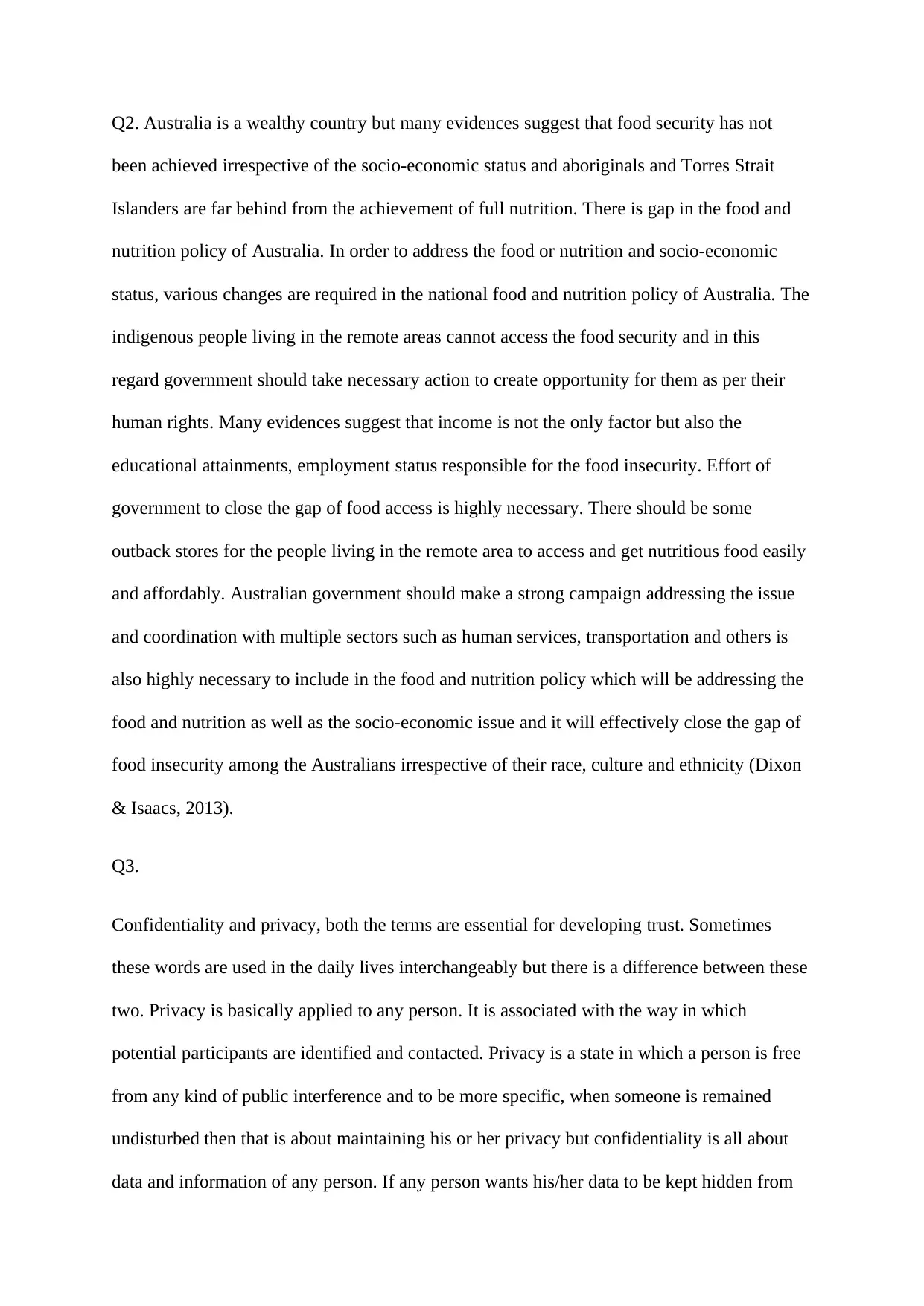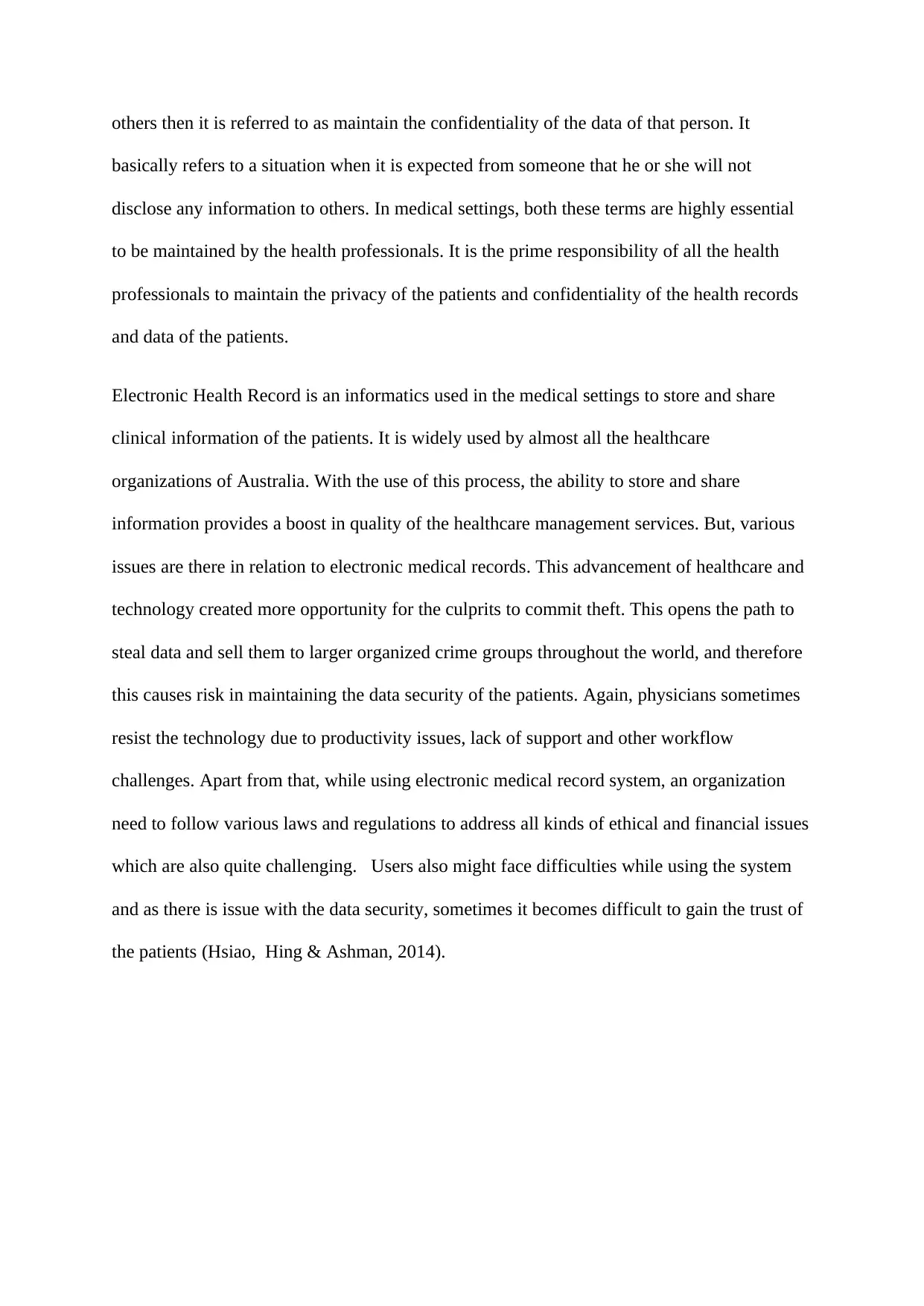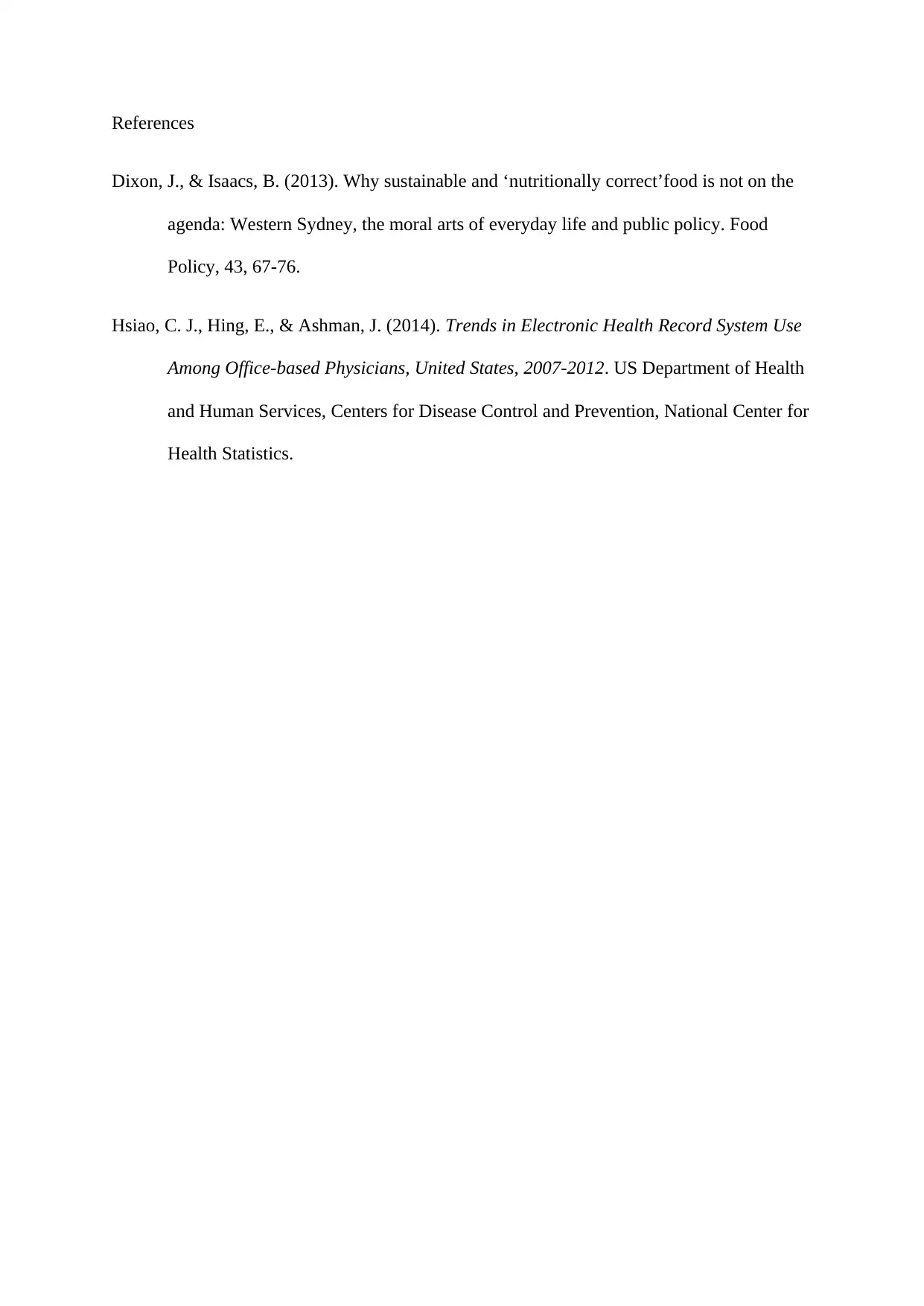Analysis of Australian Food Policy and Medical Data Confidentiality
VerifiedAdded on 2023/05/29
|3
|774
|161
Report
AI Summary
This report addresses critical issues in Australia, focusing on food security, nutrition policy, and medical data confidentiality. It highlights the disparities in food access among different socio-economic groups, particularly Indigenous Australians, and recommends policy changes to ensure equitable access to nutritious food. The report also examines the challenges of maintaining patient privacy and data security in the context of electronic health records, emphasizing the need for robust regulations and ethical practices to protect sensitive medical information. The content is available on Desklib, a platform offering study tools and resources for students.

Q2. Australia is a wealthy country but many evidences suggest that food security has not
been achieved irrespective of the socio-economic status and aboriginals and Torres Strait
Islanders are far behind from the achievement of full nutrition. There is gap in the food and
nutrition policy of Australia. In order to address the food or nutrition and socio-economic
status, various changes are required in the national food and nutrition policy of Australia. The
indigenous people living in the remote areas cannot access the food security and in this
regard government should take necessary action to create opportunity for them as per their
human rights. Many evidences suggest that income is not the only factor but also the
educational attainments, employment status responsible for the food insecurity. Effort of
government to close the gap of food access is highly necessary. There should be some
outback stores for the people living in the remote area to access and get nutritious food easily
and affordably. Australian government should make a strong campaign addressing the issue
and coordination with multiple sectors such as human services, transportation and others is
also highly necessary to include in the food and nutrition policy which will be addressing the
food and nutrition as well as the socio-economic issue and it will effectively close the gap of
food insecurity among the Australians irrespective of their race, culture and ethnicity (Dixon
& Isaacs, 2013).
Q3.
Confidentiality and privacy, both the terms are essential for developing trust. Sometimes
these words are used in the daily lives interchangeably but there is a difference between these
two. Privacy is basically applied to any person. It is associated with the way in which
potential participants are identified and contacted. Privacy is a state in which a person is free
from any kind of public interference and to be more specific, when someone is remained
undisturbed then that is about maintaining his or her privacy but confidentiality is all about
data and information of any person. If any person wants his/her data to be kept hidden from
been achieved irrespective of the socio-economic status and aboriginals and Torres Strait
Islanders are far behind from the achievement of full nutrition. There is gap in the food and
nutrition policy of Australia. In order to address the food or nutrition and socio-economic
status, various changes are required in the national food and nutrition policy of Australia. The
indigenous people living in the remote areas cannot access the food security and in this
regard government should take necessary action to create opportunity for them as per their
human rights. Many evidences suggest that income is not the only factor but also the
educational attainments, employment status responsible for the food insecurity. Effort of
government to close the gap of food access is highly necessary. There should be some
outback stores for the people living in the remote area to access and get nutritious food easily
and affordably. Australian government should make a strong campaign addressing the issue
and coordination with multiple sectors such as human services, transportation and others is
also highly necessary to include in the food and nutrition policy which will be addressing the
food and nutrition as well as the socio-economic issue and it will effectively close the gap of
food insecurity among the Australians irrespective of their race, culture and ethnicity (Dixon
& Isaacs, 2013).
Q3.
Confidentiality and privacy, both the terms are essential for developing trust. Sometimes
these words are used in the daily lives interchangeably but there is a difference between these
two. Privacy is basically applied to any person. It is associated with the way in which
potential participants are identified and contacted. Privacy is a state in which a person is free
from any kind of public interference and to be more specific, when someone is remained
undisturbed then that is about maintaining his or her privacy but confidentiality is all about
data and information of any person. If any person wants his/her data to be kept hidden from
Paraphrase This Document
Need a fresh take? Get an instant paraphrase of this document with our AI Paraphraser

others then it is referred to as maintain the confidentiality of the data of that person. It
basically refers to a situation when it is expected from someone that he or she will not
disclose any information to others. In medical settings, both these terms are highly essential
to be maintained by the health professionals. It is the prime responsibility of all the health
professionals to maintain the privacy of the patients and confidentiality of the health records
and data of the patients.
Electronic Health Record is an informatics used in the medical settings to store and share
clinical information of the patients. It is widely used by almost all the healthcare
organizations of Australia. With the use of this process, the ability to store and share
information provides a boost in quality of the healthcare management services. But, various
issues are there in relation to electronic medical records. This advancement of healthcare and
technology created more opportunity for the culprits to commit theft. This opens the path to
steal data and sell them to larger organized crime groups throughout the world, and therefore
this causes risk in maintaining the data security of the patients. Again, physicians sometimes
resist the technology due to productivity issues, lack of support and other workflow
challenges. Apart from that, while using electronic medical record system, an organization
need to follow various laws and regulations to address all kinds of ethical and financial issues
which are also quite challenging. Users also might face difficulties while using the system
and as there is issue with the data security, sometimes it becomes difficult to gain the trust of
the patients (Hsiao, Hing & Ashman, 2014).
basically refers to a situation when it is expected from someone that he or she will not
disclose any information to others. In medical settings, both these terms are highly essential
to be maintained by the health professionals. It is the prime responsibility of all the health
professionals to maintain the privacy of the patients and confidentiality of the health records
and data of the patients.
Electronic Health Record is an informatics used in the medical settings to store and share
clinical information of the patients. It is widely used by almost all the healthcare
organizations of Australia. With the use of this process, the ability to store and share
information provides a boost in quality of the healthcare management services. But, various
issues are there in relation to electronic medical records. This advancement of healthcare and
technology created more opportunity for the culprits to commit theft. This opens the path to
steal data and sell them to larger organized crime groups throughout the world, and therefore
this causes risk in maintaining the data security of the patients. Again, physicians sometimes
resist the technology due to productivity issues, lack of support and other workflow
challenges. Apart from that, while using electronic medical record system, an organization
need to follow various laws and regulations to address all kinds of ethical and financial issues
which are also quite challenging. Users also might face difficulties while using the system
and as there is issue with the data security, sometimes it becomes difficult to gain the trust of
the patients (Hsiao, Hing & Ashman, 2014).

References
Dixon, J., & Isaacs, B. (2013). Why sustainable and ‘nutritionally correct’food is not on the
agenda: Western Sydney, the moral arts of everyday life and public policy. Food
Policy, 43, 67-76.
Hsiao, C. J., Hing, E., & Ashman, J. (2014). Trends in Electronic Health Record System Use
Among Office-based Physicians, United States, 2007-2012. US Department of Health
and Human Services, Centers for Disease Control and Prevention, National Center for
Health Statistics.
Dixon, J., & Isaacs, B. (2013). Why sustainable and ‘nutritionally correct’food is not on the
agenda: Western Sydney, the moral arts of everyday life and public policy. Food
Policy, 43, 67-76.
Hsiao, C. J., Hing, E., & Ashman, J. (2014). Trends in Electronic Health Record System Use
Among Office-based Physicians, United States, 2007-2012. US Department of Health
and Human Services, Centers for Disease Control and Prevention, National Center for
Health Statistics.
⊘ This is a preview!⊘
Do you want full access?
Subscribe today to unlock all pages.

Trusted by 1+ million students worldwide
1 out of 3
Related Documents
Your All-in-One AI-Powered Toolkit for Academic Success.
+13062052269
info@desklib.com
Available 24*7 on WhatsApp / Email
![[object Object]](/_next/static/media/star-bottom.7253800d.svg)
Unlock your academic potential
Copyright © 2020–2026 A2Z Services. All Rights Reserved. Developed and managed by ZUCOL.





